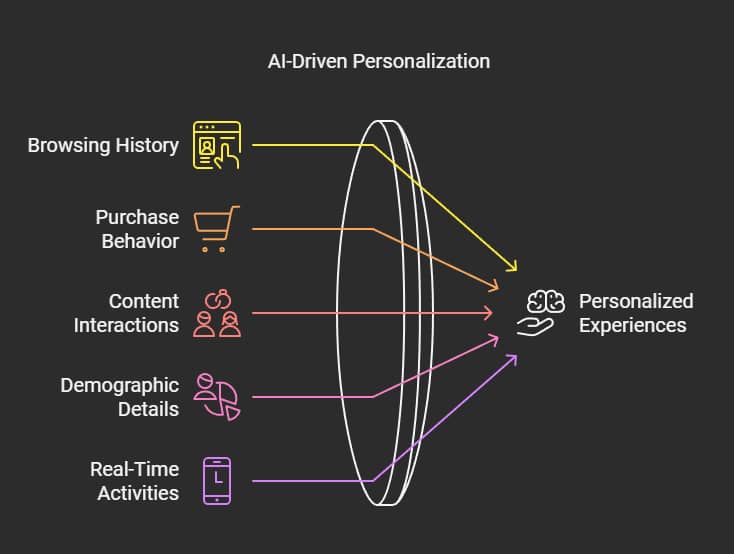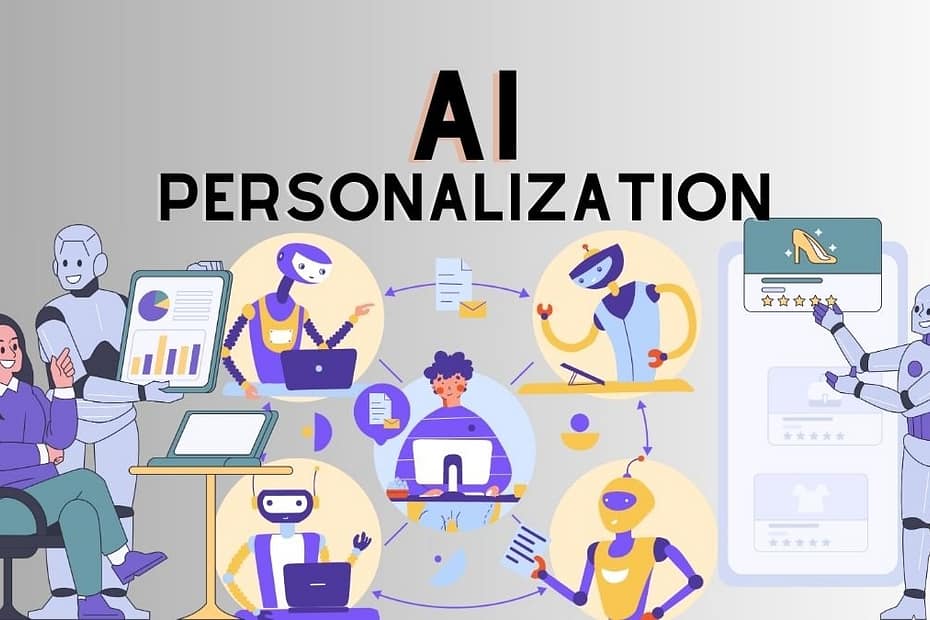Gone are the days of one-size-fits-all marketing. Thanks to AI personalization, brands can now craft experiences that feel custom-made. By tapping into your browsing habits, past purchases, and even your social media activity, AI-powered personalization ensures you get what you need before you even ask for it.
The results? Happier customers, stronger loyalty, and better business outcomes. With tools like machine learning personalization and predictive analytics, brands are reimagining how they connect with their audience.
But how does it all come together? And what makes AI in personalized marketing campaigns so effective? Let’s break it down.
Table of Contents
What is AI Personalization?
AI personalization refers to the use of artificial intelligence technologies to tailor content, recommendations, and experiences to individual users based on their preferences, behaviors, and characteristics.
This advanced approach to personalization leverages machine learning (ML) algorithms, natural language processing (NLP), and predictive analytics to analyze vast amounts of user data and deliver highly relevant content in real-time.
“A little bit of AI can go a long way to reduce costs and drive revenue when you have the right data and the right use case.” – Paul Roetzer, Founder and CEO, Marketing AI Institute
How AI Enables Personalized Experiences
At the heart of AI personalization lies one key ingredient: data. Every click, purchase, and interaction tells a story. AI uses this information to create experiences that feel tailored to each individual.
But how does it actually work? Let’s break it down.
Data Analysis and Pattern Recognition
AI algorithms dive deep into large datasets to uncover insights that drive intelligent personalization. These datasets include everything from:
- Browsing history
- Purchase behavior
- Content interactions
- Demographic details
- Real-time activities

Using advanced machine learning models, AI identifies patterns and trends in this data to predict individual preferences and interests. For example, it can anticipate what products you’re most likely to buy or the kind of content you’ll enjoy next.
What makes this truly revolutionary is the system’s ability to adapt dynamically. As users interact more, AI continuously refines its predictions, ensuring that recommendations and content stay relevant. This real-time learning creates a seamless experience that feels personal and intuitive.
However, with great power comes responsibility. Businesses must ensure ethical data practices, respecting privacy while harnessing the potential of AI-powered personalization to build trust and deliver unmatched customer experiences.
Customer Segmentation
Not all customers are the same, and that’s where AI’s ability to segment shines. By analyzing behaviors, preferences, and needs, AI-powered personalization breaks audiences into precise groups.
AI uses methods like RFM analysis (Recency, Frequency, Monetary) and behavioral segmentation to categorize users effectively. For example:
- A frequent buyer who spends significantly gets prioritized for loyalty perks.
- A casual browser receives tailored content to encourage first-time purchases.
This level of detail goes beyond demographics. AI-driven customer segmentation dives deep into how individuals engage with a brand—how often, how much, and in what ways.
These insights enable businesses to create highly targeted campaigns, such as sending exclusive offers to high-value customers or crafting re-engagement ads for those at risk of leaving.
With AI personalization, these segments aren’t static. As user behaviors evolve, AI adapts, keeping campaigns sharp and relevant. This dynamic approach ensures that businesses stay one step ahead in delivering personalized experiences.
Personalized Recommendations
One of the most powerful aspects of AI personalization is the ability to recommend products, content, or services tailored to each user. Whether it’s a product suggestion on an e-commerce site or a new playlist on a music streaming service, AI is constantly refining its recommendations to make sure they’re relevant.
AI uses machine learning algorithms to track your past interactions—like what you’ve bought, what you’ve watched, or what you’ve liked—and uses that data to predict what you’ll be interested in next. It’s not just about showing you random items; the system learns your unique preferences over time, giving you smarter, more accurate suggestions.
Take Amazon, for example. When you’re browsing, it doesn’t just throw random products your way. Instead, it presents recommendations based on your previous purchases and browsing history, making the shopping experience feel personal. As AI continues to learn, these recommendations get better and more tailored to your tastes.
And it’s not just about products. Platforms like Netflix or Spotify use AI to recommend shows, movies, or music based on what you’ve watched or listened to before. This form of AI-powered personalization keeps users engaged, making their experience more enjoyable and intuitive.
The key takeaway? AI-driven personalization ensures that the more you interact with a system, the more relevant and useful the recommendations become, creating a truly personalized experience.
““AI is the automation of automation, where software writes software. This is the single most powerful force of our time.” – Jensen Huang, CEO of NVIDIA
Dynamic Content Delivery
AI doesn’t just stop at recommendations—it also drives how content is delivered. AI-powered personalization ensures that every piece of content you see is tailored to your preferences, making each interaction feel unique.
Let’s take websites as an example. Instead of showing everyone the same homepage, AI adjusts the content based on what it knows about the user. If you’ve previously looked at fitness equipment, you might be greeted with offers for the latest gym gear.
If you’re into travel, your homepage could feature exciting destination deals. This dynamic delivery of content keeps things fresh, engaging, and relevant.

It’s not limited to websites either. Ads and banners are also personalized in real time. Thanks to machine learning algorithms, brands can serve up targeted ads based on a user’s browsing history, purchase behavior, or even location.
So when you see that ad for the exact pair of shoes you were eyeing last week? That’s AI at work, delivering tailored content in the moment.
AI’s power to deliver the right content at the right time leads to better engagement. Users are more likely to interact with content that feels relevant to them, which in turn helps businesses keep their audiences interested and coming back for more.
👉 Stay updated. Check out this list of content marketing trends for 2025.
Predictive Analytics
One of the most fascinating aspects of AI-powered personalization is its ability to predict future behaviour. Thanks to machine learning and complex algorithms, AI can analyze past interactions and forecast what a customer might do next.
This isn’t just about guessing; it’s about using data to make educated predictions. For example, AI can predict when a customer might churn (leave), allowing businesses to take proactive steps to retain them, like sending a special offer or personalized reminder.
Similarly, AI can predict a customer’s likelihood to purchase a product based on their previous behavior and similar patterns from others.
By predicting future actions, businesses can stay ahead of the game. Whether it’s anticipating when a customer will need a product refill, or knowing when a user is likely to make a purchase, personalized recommendations by AI helps brands create experiences that feel intuitive and timely.
What’s even more impressive is how these predictions improve over time. The more data AI collects, the more accurate its predictions become, continuously refining its ability to serve the right content, recommendations, and offers.
Predictive analytics allows businesses to deliver a more personalized experience, but it also drives smarter decision-making, enhancing both the customer experience and the bottom line.
Benefits of AI Personalization
AI personalization offers significant benefits for businesses across various industries, enhancing customer experiences and driving business performance. Here are the key advantages:
Increased Revenue and Conversion Rates
AI-powered personalization can drive a significant boost in revenue. In fact, fast-growing organizations make 40% more revenue from personalization than their slower-moving counterparts.
Take Amazon, for example. Its AI-driven product recommendations aren’t just a nice touch—they’re a major contributor to higher conversion rates and increased average order values. In fact, businesses that use AI personalization, like HP Tronic, saw a 136% increase in conversion rates for new customers. That’s the kind of impact personalization can have.
Enhanced Customer Engagement and Satisfaction
Consumers love personalization—and when it’s done right, it leads to stronger engagement and satisfaction. McKinsey’s report shows a massive 76% of customers get frustrated when they don’t receive personalized interactions.
And the numbers don’t lie: the same report highlights that 78% of customers are more likely to repurchase when they feel a brand understands them. No wonder 82% of organizations use AI personalization to enhance their customer experience—it works.
Improved Customer Retention and Loyalty
By anticipating customer needs and delivering tailored experiences, AI can help reduce frustration and keep customers coming back. Personalization isn’t just about one-off sales; it builds long-term relationships, fostering loyalty and increasing customer lifetime value.
The more a business can predict and meet customer needs, the less likely they are to lose them to competitors.

Optimized Marketing Efforts and ROI
When done right, AI personalization makes your marketing efforts smarter, not harder. Organizations using AI for personalization see five to eight times the return on marketing spend.
That’s because AI helps optimize marketing spend by delivering content and offers to the right audience, reducing wasted resources. By narrowing down to the most receptive audience segments, your marketing efforts become more efficient and effective.
Scalability and Real-Time Adaptation
One of the best things about AI is its scalability. It allows businesses to deliver personalized experiences to millions of people at once—without sacrificing quality.
Plus, AI systems adapt in real-time. As customer behavior shifts, the personalization adapts, ensuring the content and offers you’re delivering are always relevant and timely.
Reduced Choice Overload
Ever felt overwhelmed by too many options while shopping online? That’s choice overload, and it’s a big reason for cart abandonment. In 2023, the average online cart abandonment rate was nearly 70%.
But AI-powered recommendation engines help narrow down the choices, guiding customers toward the most relevant products, which can potentially reduce cart abandonment rates.
AI Personalization in Action: Real-World Examples
AI personalization is already transforming industries, with some top brands leading the way. Let’s look at a few examples:
- E-commerce: Amazon uses AI-powered product recommendations to suggest relevant items, boosting conversion rates and order values. These personalized suggestions are driven by machine learning, adapting based on user interactions.
- Content Marketing: Spotify leverages personalized content recommendations to keep users engaged. By analyzing listening patterns, it tailors playlists and suggests music, making the experience feel custom-made for each listener.
- Marketing Campaigns: Airbnb uses AI personalization in its email campaigns, sending targeted offers based on past bookings and preferences. Similarly, Uber customizes its push notifications to users based on their ride history and locations.
These companies are just a few examples of how AI-powered personalization can be a game-changer. By tapping into data, understanding customer preferences, and delivering personalized experiences, brands can build stronger relationships and see impressive results.
Wrapping It Up: The Future of AI Personalization
In today’s fast-paced market, businesses can’t afford to ignore the power of AI-powered personalization. It’s not just a trend—it’s the future. By harnessing AI, brands can create deeply personalized customer experiences that drive engagement, improve retention, and boost revenue.
AI makes it easier to understand and predict customer behaviour, optimize marketing spend, and deliver relevant content at scale. And as AI technology continues to evolve, these benefits will only grow, helping businesses stay ahead of the curve.
So, whether you’re looking to enhance your e-commerce experience, optimize your marketing campaigns, or create a more tailored user journey, AI personalization is your secret weapon.
Ready to take your marketing to the next level? My AI-driven solutions can help you get there, providing you with the tools to create smarter, more effective campaigns that resonate with your audience.
Get started with AI-powered marketing—lower your marketing spends, increase your ROAS, and grow your brand strategically. Fill the form and I’ll get back to you at the earliest.

